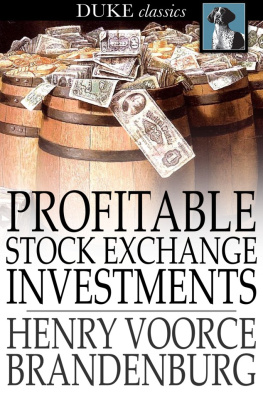Fourth Dialogue
Shareholder: In the first dialogue I dealt with the beginnings and the etymology of the stock exchange, with the wealth of the Company, the considerable extension of the speculation, and the meaning of the premium business, while I made some allusion to the swindling manoeuvres.
In the second dialogue I explained to you the instability of prices and the reasons therefor, gave advice for a successful speculation, pointed out the causes of the ups and downs, talked about the fears of the bears and courageous attitude of the bulls, about the results of the bold enterprise of the latter and the significance of the timid procedure of the former, about the signs of the upheavals and their incomprehensibility, the frenzy and the foolishness of the speculation, the language used on the exchange, and the expressions which are customary there.
In the third dialogue I began to explain to you various transactions, to teach you some of the rules [of the game], and to clarify some of the business practices. I talked about the equity of the contracts, the time of delivery, the place of the transference of the shares, the location of the business, the indecent behavior [on the Exchange], the unrest, the vulgarities, the handshakes, the impossibility of getting out of the Exchange frenzy, the West Indian Company, the principles of the ducaton speculation, the types of Exchange people, the delay in the settlement of the accounts, the varieties of brokers, their conscientiousness, their risks, and their temerity. Therefore, only a description of the most speculative part of the business is now left to me, the climax of the Exchange transactions, the acme of Exchange operations, the craftiest and most complicated machinations which exist in the maze of the Exchange and which require the greatest possible cunning
Some ten or twelve persons [will, for example,] get together at the Exchange and form a ring (which is called a "Cabala," as already mentioned). When this ring thinks it advisable to sell shares, the means for prudently carrying out this purpose are given much thought. The members initiate action only when they can foresee its result, so that, apart from unlucky incidents, they can reckon on a rather sure success
They [the ring of the bears] strike the first blow with time sales, reserving the cash sales for the moment of greater distress. They sell 50,000 pounds for various [forward] months, an operation through which a decline of prices is bound to occur. The declining tendency spreads, the [ring of the] bears receives help from other speculators, and it becomes obvious that, with so broad a participation, the object [of the machinations] is sure to be achieved. The leaders of such manoeuvres can be called "Princes of the Tail," as Amadeo I of Savoy was called the "Duke of the Tail" because of his numerous suite. This expression can be applied to the leaders of the bears because of the untold hosts of adherents, or because their followers cling to them, or because these followers should carry their leaders' trains. As there are so many people who cannot wait to follow the prevailing trend of opinion, I am not surprised that a small group becomes an army. [Most people] think only of doing what the others do and of following their examples
The first trick [of the bears' ring] is the following: in order to prevent numerous extensions of the contracts by which the great financiers buy shares for cash and sell them on term, contenting themselves with [a spread in price equivalent to] the interest on the money invested, the ring arranges sales for later dates at the same price at which the shares are being sold for cash; in the hope of a greater profit, they do not pay attention to the loss of interest. They are like Aesop's dog which let go the meat because its shadow appeared bigger to him.
Secondly, a broker in whom the syndicate has confidence is given the order to buy secretly a batch of shares from an [avowed] bull, without revealing his real principal. But he sells the very same shares with a good deal of publicity, while it is shouted out that even the bulls are making sales. As the broker wants to sell to one bull the same shares he has bought from another bull, the first one sees that the story about the sales of the latter is true. Alarmed, the second bull sells his shares also. Seized by fear, everybody tries to forestall the sales of the others and regards any advice to buy as deceitful. Such a panic we call "to be in tortures," and innumerable [traders] take to their heels when even the slightest suspicion is roused
Thirdly, the syndicate of the bears sells some blocks of shares for cash to one of the wealthy people who live on the hypothecation of stocks. As it is known that the latter [as a matter of course] sell at once for future delivery the shares which they have bought for cash, the syndicate bids its broker [charged with the execution of the manoeuvre], before the fixing of the prices [of the day], to send a message very secretly to the agent of every business firm [represented on the Exchange], a communication which will soon be an open secret, to the effect that the great capitalist has received important news, and that alarmed by it he intends to sell stocks. When afterwards the sales are actually made, the swindle seems to be verified, the aim is reached, fear spreads, and a crash of prices is brought about. But the panic can easily be explained if the speculators suspect a change of opinion by their protectors and see their foundations shaken.
Fourthly, at the beginning of a campaign, the syndicate borrows all the money available at the Exchange and makes it apparent that it wishes to buy shares with this money. Afterwards, however, large sales are executed. Thus two birds are killed with one stone. First, the Exchange is supposed to believe that the original plan is altered because of important news; secondly, the bulls are prevented from finding money for hypothecating their shares. They are, therefore, compelled to sell, since they do not have the money to take up the stock [or else fall into the trap described as the seventh stratagem]
The fifth stratagem [of the syndicate] consists in selling the largest possible quantity of call options in order [apparently by the absorption of available loan funds] to bring pressure on the payers of premiums to sell the stocks if they exercise their right to call.
The sixth stratagem is to enter into as many put contracts as possible, until the receivers of the premiums [assumed to be bulls] do not dare to buy more stock [on their own initiative]. [Their hands will be largely tied] because they are already obliged to take the stock [covered by the put premiums, if requested so to do]. Therefore the speculation for a decline has free course and is an almost sure success. We say of those who buy by means of a forward call contract and sell at a fixed [future] term or of those who sell by means of a put contract and buy at a fixed [future] term that they shift the course of their speculation. But as [the course chosen] may turn out to be the wrong [line of] speculation and the right way can thus be missed, [such a shift] is rarely made.
The seventh stratagem is to recognize that the bulls are in need of shares to survive the siege; and so [the bears] give them money. Then [the bears] sell the hypothecated shares again and, with the difference between what they receive on the sales and what they loan on the shares, they are able to engage in further call and put operations.
This is a devilish trick, since, as it were, immortality is promised and death is given. It seems as if the bears give life to the bulls by lending them money [when they hypothecate] the stocks which the latter have bought; [but the ring turns around and sells these shares, so that the bulls have] to buy again the stocks which they had hypothecated










